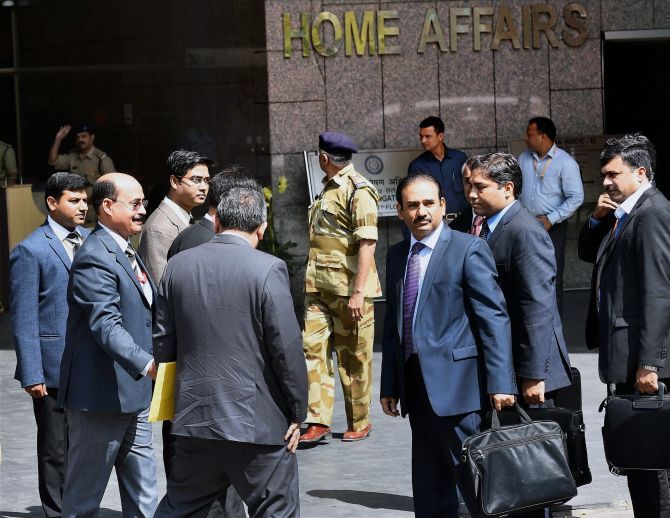
If Pakistan allows India to send its investigation team to question Azhar it would take the India-Pakistan camaraderie to a new level, says Rajeev Sharma.
India is understood to have unveiled its clever strategy to the Pakistani Joint Investigation Team. Its move to allow the five-member JIT, which included an Inter Services Intelligence officer, access to the Pathankot airbase was essentially a reciprocal exercise and as a quid pro quo New Delhi would like access to Pakistan-based Jaish-e-Mohammed chief Masood Azhar and others for questioning.
This was conveyed by the Indian side to the Pakistani JIT during their interactions. There was no response from the Pakistani team. No response was needed in any case as the decision to accept or reject the Indian request would be decided at the highest political levels.
India is likely to make a formal request to Pakistan in this regard soon.
The Narendra Modi government has invested hugely in its strategy to improve relations with Pakistan and the timing of the JIT completing its Pathankot visit on the eve of Modi's three-nation tour was well choreographed by both sides.
I stated in an earlier column that the India-Pakistan detente is being driven by the Prime Minister's Office of the two countries.
The signs of growing synergy, however, will be tested when India formally requests Pakistan to allow an Indian investigation team to question Azhar and others.
As of now, the PMOs-driven synergy is essentially an event management kind of exercise with a deep focus on imagery and symbolism and little on the substantive progress which passes muster at the jurisprudence level in the two countries' legal systems.
Thus far, the Congress attack on the Modi government that the Pakistani JIT arriving in India without a formal letter rogatory has no judicial accountability or admissibility seems valid. But what Narendra Modi and his Pakistani counterpart Nawaz Sharif are perhaps attempting to do is to create a proper atmosphere first and the substantive issues can be taken up later. The two prime ministers are past masters in the art of event management.
If Pakistan allows India to send its investigation team to question Azhar it would take the India-Pakistan camaraderie to a new level. Naturally, in such an event the Indian team too would go to Pakistan without a letter rogatory.
This seems to be the most important objective of the Pakistani JIT's visit to the Pathankot airbase. Whether it would happen or not is in the womb of time.
The Pakistan JIT's Pathankot visit should also be seen as a give-and-take accommodative spirit between the two nuclear armed adversaries. It is purported to be a chain. It will be broken if either side chooses to retreat when its time of 'giving' comes up. The success or failure of this experiment hinges on this one point alone: Give-and-take.
A tangible achievement the two governments can boast of is that their cooperation has now extended to intelligence and security arenas which were no-go areas earlier.
The two sides can draw succour from the fact that their earlier Joint Anti Terror Mechanism, tried during the United Progressive Alliance regime, had failed miserably. Through the JATM, the two sides had attempted to drive synergy between the two sides at the levels of intelligence and security where it matters most.
This is what Modi can serenade to the international community -- first to the Europeans during his visit to Belgium (March 29-30), then to the Americans when he visits Washington, DC (March 31-April 1) for the fourth and final Nuclear Security Summit, and then finally to Saudi Arabia, Pakistan's biggest Muslim ally and strategic partner, when he undertakes a bilateral visit (April 2-3).
The biggest test of the ongoing new India-Pakistan experiment would be to see how far the Pakistani military establishment is accommodative of this detente. Indications are that Rawalpindi, the seat of military power, is currently giving a long rope to Islamabad, the seat of political power. The Pakistan army does not want turbulence at the Pakistan-India border.
But the Pakistani military establishment's real intentions will be known when India seeks access for its investigation team to question Masood Azhar and his cronies.
Rajeev Sharma is an independent journalist and strategic analyst who tweets @Kishkindha.










